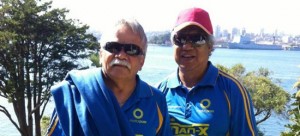
Steve, who’s legally blind, says the trip, which concluded at the end of October when the men were received at Kirribilli House by the Prime Minister’s partner and Men’s Health Patron, Mr Tim Mathieson, was a success.
“We are both advocates for men’s health and after six men died in my community from preventable conditions, and knowing that every week somewhere in our communities they are burying men, it was time to do something to raise awareness,” Steve says.
“There are lots of policies and programs, but still men are dying. We stopped at every Aboriginal Medical Service and got a favourable response. We spoke to hundreds of men along the way to deliver the central message that it is up to the men themselves to make the decision to look after themselves. Men don’t talk about their health like women do and they wait until it’s too late to seek help.”
It’s important to take that first step toward good health, and that can be as simple as getting a health check from the local Aboriginal Medical Service.
“I asked men along the way if they could name their doctor. Not one had a relationship with a doctor. If you don’t have a connection with your doctor then you have no connection with your health.”
Physical, social and emotional wellbeing issues, including relationships with family, are the major impacts on men’s health.
“Healthy men equal healthy families. It’s not just the physical but mental health as well, and drug and alcohol abuse. It’s also about social wellbeing and environmental health and spirituality. The physical aspect is only one aspect,” Steve says.
Steve and Dr Adams promoted healthy lifestyle choices along the way too on the trip that was dubbed ‘Walk and Ride with Widders’. “We made people feel a bit uncomfortable by taking them out of their comfort zones. We wanted to stop the complacency.”
Another key message Steve wanted to get across was that men matter. They are valuable to their families and to society.
“If you don’t want to do it for yourself, then do it for your family or someone else in your life.”
Steve knows first-hand what it’s like to lose your health. When the 56 year old became blind 22 years ago, he spiralled into depression and became alcohol dependent.
“I had no self-esteem, no confidence or value as a person. I was going to work for the community and doing things for other people but I wasn’t looking after myself. You can’t save anyone else when you’re drowning yourself,” he says.
So he gave up alcohol, cigarettes, formed a relationship with his doctor and began eating good food, and exercising.
“I turned adversity into advantage. Mick and I might be older men, but we are healthy and if we can do this ourselves, we thought let’s motivate others to take responsibility for their own health.”
Both men are planning another walk/cycle, only this time they will tackle the Nullarbor in July next year. They want to raise awareness of men’s health in remote communities along the way.
“While we’ve got the runs on the board,” Steve says.
Comments are closed.